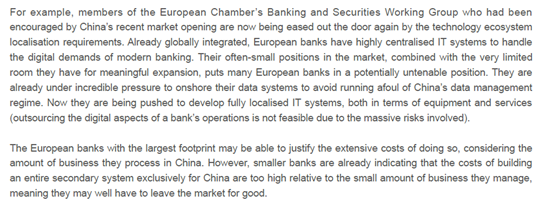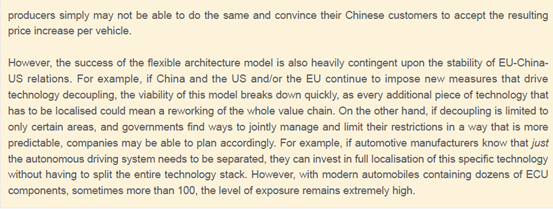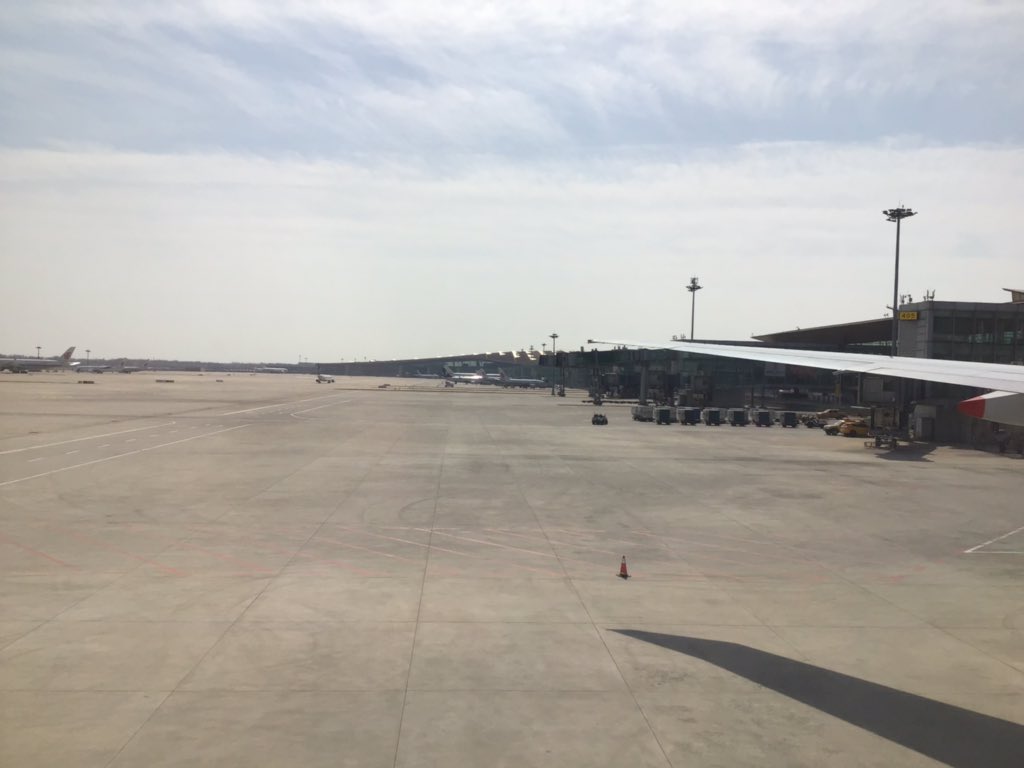
BIG WORK NEWS: The @europeanchamber and @merics launched our joint report on the impacts of decoupling on European companies today. Here’s a THREAD on the key findings, but I highly encourage everyone to give this unique report a proper read through the link below 1/
https://twitter.com/EuropeanChamber/status/1349535729815232513
TLDR: forget the trade and financial wars, the tech war is where the horror lies. The US securitisation push and China’s self-reliance campaign are leading down a path of divergent tech ecosystems that are going to devastate economies of scale. 2/
Most analysis of decoupling is limited: the trade war, semicons, financial war, etc.
We did a deep dive into 9 layers of decoupling: political and financial; supply chains and critical inputs; standards and R&D; and data, network equipment and telecommunications services. 3/
We did a deep dive into 9 layers of decoupling: political and financial; supply chains and critical inputs; standards and R&D; and data, network equipment and telecommunications services. 3/
We draw on 196 survey responses and ~60 company and ~20 expert interviews to paint a truly comprehensive picture of what’s happening and where things are headed. In general, companies overestimate their awareness, underestimate their exposure, and are insufficiently prepared. 4/ 

We find that moderate concerns exist in political, financial and supply chain decoupling: 5/
Political issues are more a driver than a direct impact, though China’s increasingly politicised business environment plus growing pressure on companies regarding operations in Xinjiang and Hong Kong are concerns for further deterioration. 6/
Financial concerns are real, but delisting Chinese companies from US markets just send them to HK, Singapore, etc. and the USDs status as a global reserve currency means sanctions have limited effect – USD can always be found. 7/
The trade war was side-stepped by MNCs—bilateral tariffs are futile in a world of global supply chains—but SMEs were more likely to take a repeated kicking. Disruptions have actually encouraged many to further onshore into China for stability. 8/
We found rising concerns in data governance and standards, which for now are smaller issues, but are set to worsen as divergence moves forward at a time when both are growing in importance. 9/
Data governance in the EU (GDPR and company) and China (Cybersecurity Law and friends) are requiring extensive data localisation and making cross border transfers challenging. As the role of data expands in innovation and efficiency-building, this will limit development. 10/
Standards are increasingly divergent as China advances its own standards at home and abroad. China should be involved in international standards setting, but companies come coordinated while European ones remain divided. European companies need to step up their game. 11/
But the real horror lies in the tech ecosystem divergence between the US and China, which is a rapidly expanding quagmire for companies to navigate. Critical inputs (semiconductors), network equipment, telecoms services and R&D all fit in here. 12/
Critical inputs like semicons compose choke-points that America has started to squeeze with Huawei and others. 27% of European companies reported that they had at least one component that they could not find an alternative source for. Losing access could be catastrophic. 13/
However, European companies are unlikely to end up on export control lists themselves, so losing direct access would basically require all of China to be blocked off, including foreign companies within. More likely, exposure would be through suppliers/customers losing access. 14/
I was shocked by how few companies we interviewed had even considered auditing exposure to this up and downstream: Upstream loss of access would mean that company still loses a component, and downstream loss of access could mean demand plummets. 15/
In either case, disruptions could lead to halting operations. Semiconductor shortages in Dec. 2020 left automakers in China crippled, with many lower-end production lines shutting down in response. That’s a shortage – imagine what outright lost access would mean. 16/
Digital divergence is part of the tech story as well. 17/
China’s expanding demand for ‘autonomous and controllable’ tech in the digital space is pushing out foreign digital solutions, while Value-added Telecoms Services rules keep foreign companies out of cloud, VPN, data-storage, etc. 18/
These and other restrictions are pulling European companies to integrate with local solutions, either through a JV, licensing out their solutions to local players, or not bothering with their own solutions and instead using local ones. 19/
The US drives divergence through a broadening definition of national security, under which all things China are increasingly affected. The goal is to purge Chinese tech under that expanding umbrella. Note that even WeChat and TikTok bans were done for nat sec reasons. 20/ 

The US ‘Clean Network’ shows how easy it is to expand the argument away from just specific companies or tech, but instead, an entire value chain that must be purged of Chinese tech ‘end to end’. 21/
So, China is pulling foreign companies into its tech ecosystem while the US is purging Chinese tech from its own ecosystem. How do European companies fit into this equation? 22/
They get screwed for being truly global companies, that’s how. A lot of European products are the result of bringing the best tech, components, and systems together from all over the world. 23/
Ex. An auto component with European engineering running Chinese software on US semiconductors will increasingly need to consider alternative semiconductors to sell in China, and different software to sell in the US. 24/
This will likely lead to a lower quality product, or a higher cost (they had the original arrangement for good reason). As well, they now need to spend on R&D to adapt that component to suit a new semiconductor/software in those markets. All very pricey. 25/
Most cars have 100+ electronic components that are potentially affected by this emerging reality. Here’s a good quick read to see the sheer scope of potential exposure 26/
caranddriver.com/features/a3203…
caranddriver.com/features/a3203…

The report goes into a ton of examples in sectors like ICT, industrial software, automotive, chemicals, machinery, etc.
It’s not hyperbolic to say that the ongoing divergence of tech ecosystems will impact basically every company. 27/
It’s not hyperbolic to say that the ongoing divergence of tech ecosystems will impact basically every company. 27/
Even something ass seemingly disconnected from production/supply chains as banks are exposed to this. Several smaller banks we spoke with said the localisation reqs were looking so worrying that the costs would just lead them to exit the China market. 28/ 

Companies we spoke with were overwhelmingly at a loss for how to address these issues. The ones most ahead of the curve were looking into one of two strategies: a ‘dual system’ or a ‘flexible architecture’. 29/ 

Dual systems would be enormously expensive, but once done, very stable. Flexible architecture would be much cheaper, but leaves companies exposed to sudden changes on either side of the tech divergence that would leave them scrambling to localize/purge accordingly. 30/ 



Here’s an oversimplified way to think about it: The more affected inputs, the harder/pricier to localize. However, even those with a high number of affected inputs could perhaps justify the additional localisation costs if they produce high volume (spread those costs out). 31/ 

Fundamentally, this is going to ravage economies of scale for production and R&D. Products are ludicrously cheap today because of mass production and streamlined supply chains, and innovation is cheap because it’s done at a global level. 33/
Breaking that down means consolidation, higher costs for companies, lower margins, and slower innovation. Translated for governments, that means lower consumption, slower growth, lost jobs, slower innovation and lower confidence. 34/
This doesn’t mean we need to return to ‘the good old days’, nor should we aim to – they were demonstrably unsustainable. But there are better alternatives to the self-destructive path we are currently on. 35/
If certain tech needs to be restricted for legitimate nat sec concerns, so be it. But we can’t just keep extending this classification across entire value chains without spurring the very real issues already progressing as discussed in this thread. 36/
Companies would do well to start preparing for these trends to deteriorate. Set up a task force that includes HQ, US and China operations and improve comms between them. Start auditing exposure, esp. for semiconductors and digital exposure. 37/
In conclusion: Check the whole report out. It’s a beast – about 100 pages – but I dare say it’s the most comprehensive look into decoupling that you’ll find. If you’re in government: solves these. If you’re in business: prepare for these. 38/ 

If you want to follow some of the sharp contributors to this report, follow these thought-leaders on all things EU-China at @merics_eu and the @EuropeanChamber
@RebeccaArcesati
@m_huotari
@J_B_C16
@acmeinhardt
@amela_ester
@TomGrootHaar
/end
@RebeccaArcesati
@m_huotari
@J_B_C16
@acmeinhardt
@amela_ester
@TomGrootHaar
/end
• • •
Missing some Tweet in this thread? You can try to
force a refresh







